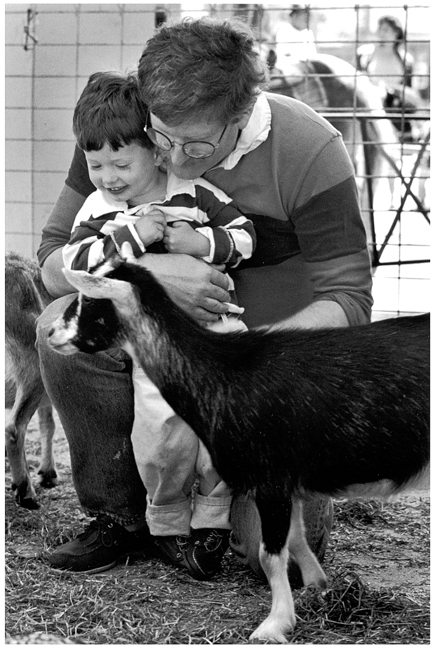
In my recent post Mine vs. Ours I noted epigenetic research by Szyf and Meaney wherein a rat's maternal behavior resulted in a biological change in gene expression within offspring under her care. That change in gene expression produced a predictable change in consequent adult behavioral tendencies. The research has not been reproduced in humans, but one cannot help questioning whether human parenting results in similar changes in offspring gene expression that in turn results in very specific adult behavioral tendencies. Take, for instance, fear. As a child, does it help lessen adult fear and help in developing adult self-confidence when Daddy is there to hold onto during formative early experiences facing down something scary? Anecdotally, it does. But can that change be traced to a foundation in altered gene expression? In other words, does Daddy's confidence producing touch precipitate a lasting change in youngster's developing biology? Such an interesting question. I can remember back when I was very young, I had taken it into my head to build something with wood, hammer, and nails. But the hammer was just too heavy for me to control. I couldn't make effective contact with the nail. I couldn't drive it into the wood. I'd miss and damage the wood or I'd hit ineffectively and the nail would go flying or bend. My incompetence drove me to tears of frustration. Then my Dad stepped into the picture. His strong hands helped steady mine. Together we drove the nail home. But oddly, the effect was lasting. His unwavering strength somehow taught my unsteady hands how to be more steady, more effectively focused. Was that change learned? Or was that change a precipitated difference in the bio-chemistry of my muscular development and coordination? Similarly later in grade school, I was fascinated by one of my classmates. He could run much faster than any of the rest of us. When we played baseball he could field a ball hit way out in the outfield then run with it all the way to home plate in time to tag the runner out before he could score. I was very impressed. I couldn't help asking if he could teach me to run that fast. Unfortunately, neither of us had any idea how we might accomplish that feat. Still, I persisted. I asked, "What if we held hands and ran?" He was willing, so we tried. The result was amazing. Together, hand in hand, I ran faster than I'd ever run before, feeling like I almost flew over the school yard. And somehow it lasted. From then on, my body knew how to run faster. Not as fast as him, but much faster than I could before. Once again, had the physical touch of another human being altered my biology, altered the expression of my genes? When my own son was very young, he had problems controlling his temper, raging and squirming and swinging his fists in frustration with whatever was happening. The temptation to bully him into submission was enormous. But I didn't. Instead, I took him into my arms and held him, sometimes tightly so that he'd have to struggle against my strength, almost like a standoff in arm wrestling. Within a short time, he'd exhaust himself and calm down. No yelling, No hitting. No bullying. He just learned to calm down. And it lasted. Not completely, but in the long run he has developed into a very aware but very composed socially adept young man. Did my touch precipitate a change in his biology? The answer, of course, is unknown at this point. But that study by Szyf and Meaney makes one wonder. Educators talk of "teachable moments". In the future, it may prove possible to calculate exactly when those malleable moments will occur for each individual student. Effective education might then no longer be an inexact matter of charm, luck, and calculated coercion over uncooperative willfulness. |
• Posted: Mar 27, 2010 12:33:03
• Comments Welcome
• Vote CoolPhotoblogs
• Purchase a Print
• Share
Saturday, April 28th, 1990 Chicago IL USA |